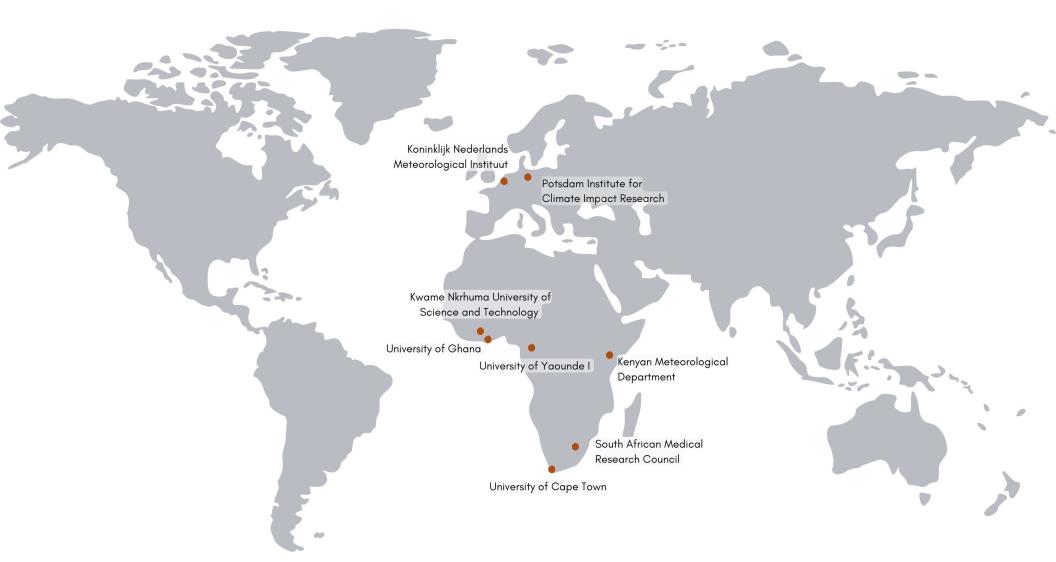Building African Climate-Health Attribution Data, Digital Tools and Capacity
Climate attribution studies have played a critical role in providing evidence of human influence on extreme weather events and in supporting key statements on the causes of climate change in successive IPCC reports. More recently, the focus of attribution science has expanded to include the impacts of climate change on nature and society, including human health. Health systems and health outcomes are known to be highly sensitive to climate-related risks through multiple pathways. However, while some studies have begun to attribute specific health impacts to climate change, these remain limited—mostly focusing on heat-related mortality and only a few other outcomes.
Africa, despite being among the regions most vulnerable to climate change, remains significantly under-represented in attribution research, especially in studies linking climate change to health impacts. This under-representation stems from several intersecting challenges: (i) Africa receives among the lowest levels of climate research funding globally; (ii) there is limited human capacity in health research, particularly at the intersection of climate, health and attribution science; and (iii) accessible digital health and climate data, along with suitable tools, are lacking.
Strengthening African-led attribution of health impacts will have multiple benefits. It can enhance climate change literacy and public engagement across the continent, support early action by identifying where climate change is already harming health, and potentially contribute to efforts to quantify loss and damage. The AFRIVERSE teams are applying a synthesis team science approach to advance synthesis research in this area.
AFRIVERSE aims to address the under-representation of Africa in climate-health impacts attribution through building (i) new climate and health data, (ii) digital tools for access, analysis and communication, and (iii) human capacity, (iv) in parallel with several Africa-focused attribution studies by teams of African scientists.
Objectives
- Increase the number of scientists working on climate-health attribution in Africa by building capability and interest among researchers and establishing a vibrant community of practice in this subject.
- Build a repository of “attribution ready” multi-country African local and regional health and climate data using existing and new data, through collaborating with teams of scientists with access to such data.
- Undertake climate-health impact attribution studies using new health data from Africa, focusing on non-communicable disease indicators, heat-illness, mental health and hospital admissions for cardiovascular and respiratory disease.
- Develop a standardised set of Africa-specific climate data for impacts attribution studies, which have been quality-controlled and are accessible to other researchers.
- Design and implement a user-friendly platform for hosting African (and potentially other regional) climate and health data, metadata, and code for analysis and visualisation, for current and future climate-health impact attribution and other impact attribution studies.
- Synthesise methods and learning from individual attribution studies in the project (and potentially other Attriverse projects) to inform future climate-health attribution research needs, and the wider fields of climate impacts attribution.
- Develop and test approaches to communicate climate-health impacts attribution for increased uptake amongst different audiences, including the general public, policy/decision makers, business and advocacy domains.
- Develop and offer a training school on climate-health impacts attribution for African early-career researchers.

Project Team
The AFRIVERSE Project is made up of 4 teams hosted by the African Synthesis Centre for Climate Change, Environment and Development (ASCEND):
Team METS -Team Leads are Lara Dugas, Piotr Wolski and Kweku Bedu-Addo
Team HABVIA -Team Leads are Mark New, Izidine Pinto and Jemima Okai
Team HOSPITAL -Team Leads are Thandi Kapwata, Joyce Kimutai and Achiri Elvis Ndikum
Team METHODS - Team Leads are Sabine Undorf, Chris Trisos and Caradee Wright
Funder
Funded by Wellcome. Wellcome supports science to solve the urgent health challenges facing everyone. We support discovery research into life, health and wellbeing, and we’re taking on three worldwide health challenges: mental health, global heating and infectious diseases.
